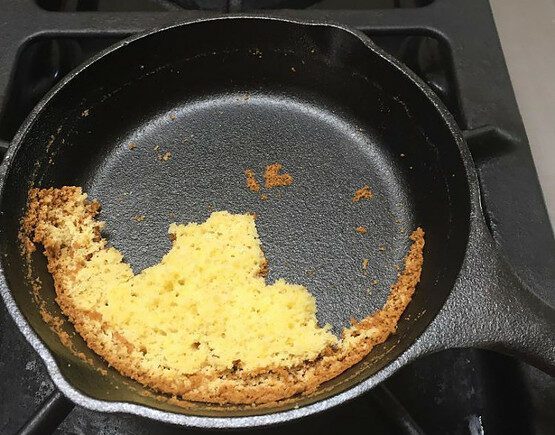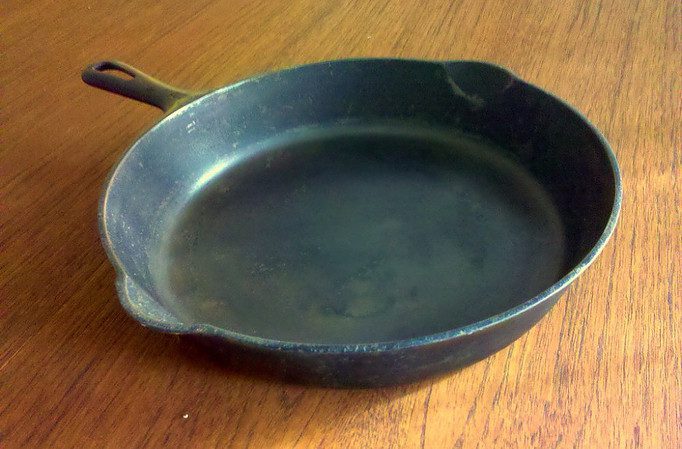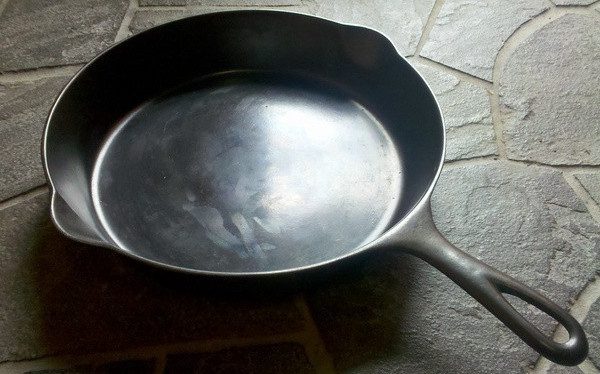Are you asking, “What happens if I don’t season my cast iron pan?
Well, it depends on what you mean by not seasoning it.
Did your pan come preseasoned?
Or did you take off all the seasoning, and now you want to know if you need to build it back up?
Maybe you want to know if you need to use oil in between uses or if oven seasoning is necessary.
I will touch on all of these things, go over the science of seasoning, as well as answer the question from the viewpoint of simply using your cast iron pan bare without having that protective coating.
So, let’s get started.
Table of Contents
What Happens If I Don’t Season My Cast Iron?
Cast iron is both durable and highly reactive. You season to keep your food from sticking and protect your pan from rust. So if you don’t season it at all, you can expect your food will stick unless you use plenty of oil while cooking. Plus, you risk your pan rusting if you leave even a drop of water on it. Do you have to season your cast iron in the oven? No, but you will need to use more oil when cooking and cook in your pan often to build up a natural seasoning over time.
1. Your Food Will Stick Without Oil

Without oil, your food will no doubt stick to the bare iron.
That’s because of a chemical bond that forms between the food and the metal.
Some foods, such as protein, are more susceptible to sticking.
And the seasoning is what helps your pan become nonstick.
It will note that chemical reactions also take place when the oil is heated in the iron. These reactions, one of which is polymerization, can happen through regular cooking over time or in the oven just using heat and oil.
If you guessed the oven method is quicker, then you guessed right.
Polymerization
| Type of Oil | Smoke Point | Flavor Neutral |
| Avacado (Virgin) | 520°F/271°C | NO |
| Safflower | 500°F/260°C | YES |
| Light/Refined Olive | 465°F/240°C | YES |
| Rice Bran | 450°F/232°C | YES |
| Soy Bean | 450°F/232°C | YES |
| Peanut | 450°F/232°C | YES |
| Corn | 450F/232°C° | YES |
| Sesame | 450°F/232°C | NO |
| Sunflower | 440°F/226°C | YES |
| Canola | 425°F/218°C | YES |
| Grapeseed | 420°F/215°C | YES |
| Vegetable | 400°F/204°C | YES |
| Extra-Virgin Olive | 375°F/190°C | NO |
| Vegetable Shortening | 360°F/182°C | YES |
| Coconut | 350°F/176°C | NO |
| Flaxseed | 225°F/107°C | NO |
Heating a thin layer of oil at a high temperature in your pan leads to polymerization. When the oil dries or bakes into the pan, it forms a permanent coating (unless you intentionally remove it).
The coating is more like plastic than oil, creating a slippery, shiny, black surface and causing it to act as a protective barrier to what makes the food stick in the first place.
Choosing the Right Oil
If you choose to season your pan in the oven, picking the right oil is important.
It’s not like there is only one oil you can use, but there are a few things you might want to think about before deciding.
Some factors to consider when choosing an oil are:
- Smoke point – oils have a temperature at which they begin to smoke, so you will want to use one with a high smoke point.
- Flavor profile – some oils transfer flavor to your food while others are considered neutral; neutral is best when seasoning in the oven.
- Price point – oils have different prices so choose one that fits your budget.
- Fat content – all oils have three types of fat, and you will want to pick an oil with higher amounts of unsaturated fats.
2. Your Pan Will Rust If Exposed to Air and Water For Too Long
I recently wrote an article about why you shouldn’t put your cast iron in the dishwasher. In the article, I gave two reasons: it removes the seasoning, and it exposes your cast iron to water and air.
The result will be rust because that’s what water and air combined do when there is no seasoning.
So, if you want to know if you need to season a bare cast iron pan in the oven, the answer is no. But you still have to protect the iron from prolonged exposure to air and water.
Doing it naturally is an option, but that means you will have to cook in your pan often, as in daily, if you want to get the nonstick protective coating in a reasonable amount of time.
And you probably will need to use more oil in your cooking.
But most important is making sure your pan is completely dry after you wash it, especially if you have bare iron.
Below is a video showing a man cooking in a skillet he had stripped of its seasoning.
Watch This Before Seasoning Your Cast Iron Skillet
So, Do I Really Need to Season My Skillet?
If you watched the video, what did you notice?
He definitely showed that you don’t have to have a protective coating to create a nonstick surface, but he did use quite a bit of oil.
Moreover, he intends to build up the seasoning by cooking in his skillet and without using the oven.
He was not saying that iron doesn’t need a protective coating to keep it from rusting; he mainly wanted us to see that seasoning in the oven isn’t necessary to have a functioning cast iron skillet.
You can use oil for cooking and still create a nonstick surface.
Over time, he expects his pan to season naturally to look like the other one on the stove that he had seasoned in the oven.
I would like to note that when he removed the seasoning, his pan was no longer pebbly.
Does that matter? I’m not sure.
Maybe not.
Or maybe it made it easier to cook in the oil.
Another thing that he pointed out is the handle wasn’t rusting, and he didn’t apply any oil to it. So the handle was continuously being exposed to the air, but not necessarily water.
And I’m pretty sure, though he didn’t say it, that he would not leave his pan wet after washing, soak it in the dishwater, or put his pan in the dishwasher.
I would be curious to know how his handle holds up over time if he continues not to add any oil to it.
Anyway, the question is, do you really need to season your cast iron skillet? And I would say again that it depends on what you mean by seasoning.
What Do You Mean By Seasoning?
Yes, you need to season your cast iron. And no, it doesn’t have to happen in the oven, but that is still the preferred way for many.
In fact, the preferred way to season a pan is in the oven and naturally.
But if you only want to do it naturally, that will work.
If you buy a new skillet, it most likely comes preseasoned.
And if you strip the seasoning off, you can build it back up naturally, through cooking with oil often.
But if you remove the seasoning in your pan and don’t season it, you have no protection from the air and water.
So, in the end, it’s your call.
Final Thoughts
That’s about all I have for now.
I hope you found the answer to your question or at least something to think about.
If you are asking, “What happens if I don’t season my cast iron skillet?” and you are referring to bare iron, I would say yes, it needs to be seasoned, either in the oven or by cooking often in your pan with plenty of oil.
But if you are asking about oven seasoning for a preseasoned pan, that’s up to you.
And if you mean does your pan need to be seasoned in between uses, I say yes, but if you are happy with the coating it has already, I guess you wouldn’t have to. I have read of others who don’t.
In the end, it is completely up to you.
Just so long as you know what seasoning is and why cast iron enthusiasts recommend it.
And as long as you understand the risks of not seasoning.
If your food sticks, it will be frustrating, and your pan will be harder to clean.
And if you get rust on your skillet, you will have to get rid of it before using your pan again, either through washing or washing and seasoning.
Let me know what you think about seasoning or not seasoning your cast iron pan.


